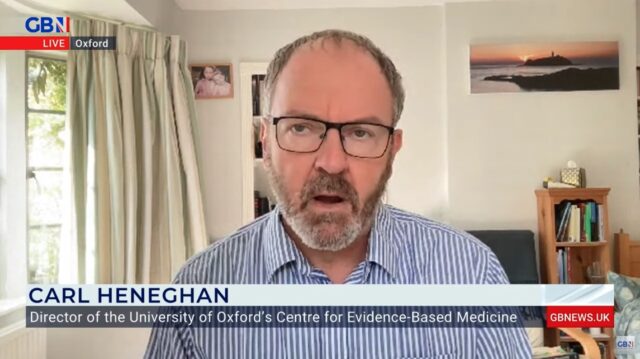TONY Blair’s claim that wearing face masks on public transport could save the NHS has been dismissed by leading epidemiologist Carl Heneghan.
Mr Heneghan, director of the University of Oxford’s Centre for Evidence-Based Medicine, told GB News: “It’s a curious sort of intervention from the Tony Blair Institute. I looked at the report and they cite two pieces of evidence to support their position, ‘we’re going to save the whole of the NHS by everybody wearing a mask on public transport’.
“That seems to be the case and what they’re looking at is an editorial which is an opinion about observational research, which is low quality evidence.
“Secondly, they refer to Germany and say, ‘well, Germany is now going to be thinking of having a mass mandate, therefore we should follow up Germany’.
“It’s interesting what the German minister says. He says the evidence is indisputable. When I have a meet anybody who says evidence is indisputable about an intervention, that sets off my alarm bell because they’re not looking at the evidence, it becomes a belief system.”
Asked what difference masks make during an interview with Esther McVey and Phillip Davies on GB News, he said: “I think if we look at it across the world, we’ve tried mask mandates. Germany tried FFP2 masks. Actually, what they do is they have not changed the cause and nature of what happened next.
“If we’re going to really think seriously about the problems in the NHS, we can’t outsource it to the Tony Blair Institute, and we certainly can’t say it’s going to be fixed with a mass mandate on public transport.”
He added: “I’ve been in the NHS now for two and a half decades and we’ve had this recurring problem of the crisis in winter. I remember going right back to 2000 when people were queuing out the door and what we’ve never done is take a medium to long term approach to solve this situation.
“The NHS seems to be the only institution I know, the only business that doesn’t embrace demand.
“I am seriously worried if we send out another message which is ‘protect the NHS, please stay away’.”
He added: “There’s a recent paper just out this week that says who’s most at risk with Covid right now, it’s actually those that are immunosuppressed.
“So, the problem is when you try to blanket coverage everybody, particularly those least at risk, the young people, what you do is you end up missing those people who are more at risk.
“What we should be thinking about is who are their high risk people, and let’s make sure we get to those and put all our effort in there and not try and give it to the low risk people where it’s going to make no difference whatsoever.”




